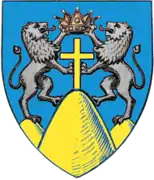Dolhasca
Dolhasca (Romanian pronunciation: [dolˈhaska]) is a town in Suceava County, north-eastern Romania. It is situated in the historical region of Western Moldavia. Dolhasca is the eighth largest urban settlement in the county, with a population of 9,792 inhabitants, according to the 2011 census. It was declared a town in 2004, along with seven other localities in Suceava County. The town administers seven villages: Budeni, Gulia, Poiana, Poienari, Probota, Siliștea Nouă and Valea Poienei.
Dolhasca | |
|---|---|
 Dolhasca Town Hall | |
 Coat of arms | |
 Location in Suceava County | |
 Dolhasca Location in Romania | |
| Coordinates: 47°25′49″N 26°36′34″E | |
| Country | |
| County | Suceava |
| Government | |
| • Mayor | Decebal Isachi[1] (PNL) |
| Area | 110.35 km2 (42.61 sq mi) |
| Population (2011)[2] | 10,298 |
| • Density | 93/km2 (240/sq mi) |
| Time zone | EET/EEST (UTC+2/+3) |
| Vehicle reg. | SV |
| Website | Official site |
Despite being a town, Dolhasca looks like a rural settlement in many aspects, and the main occupation of the inhabitants is agriculture. The Probota Monastery, built in 1530 by Moldavian ruler Petru Rareș, is close to the town. Among Dolhasca's notable natives are comedian Alexandru Arșinel and neurosurgeon Constantin N. Arseni.
Demographics
| Year | Pop. | ±% |
|---|---|---|
| 2002 | 11,009 | — |
| 2011 | 9,792 | −11.1% |
| Source: Census data | ||
In 2002, Dolhasca had a population of 11,009 inhabitants, 90% of which were Romanians and the rest Roma. At that time, it was one of the most populated rural localities in Suceava County.
Notes
- "Results of the 2016 local elections". Central Electoral Bureau. Retrieved 5 April 2020.
- "Populaţia stabilă pe judeţe, municipii, oraşe şi localităti componenete la RPL_2011" (in Romanian). National Institute of Statistics. Retrieved 4 February 2014.
External links
| Wikimedia Commons has media related to Dolhasca. |
- (in Romanian) Dolhasca Town Hall official site
- (in Romanian) Ecomunitate – Dolhasca web page
- (in Romanian) Suceava County site – Dolhasca web page
